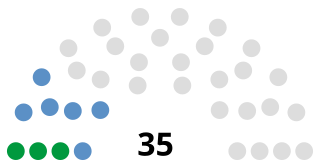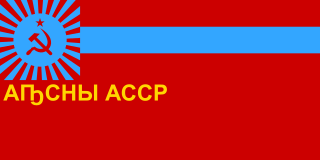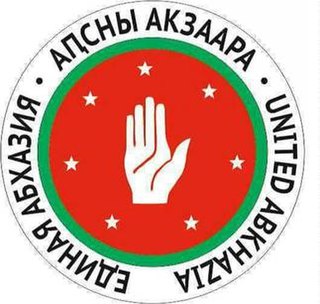
Raul Jumkovich Khajimba is the current President of Abkhazia, having been elected in 2014 after the May Revolution. He was also Chairman of the Forum for the National Unity of Abkhazia from 2010–2015. Khajimba previously held the offices of Vice President (2005–2009), Prime Minister (2003–2004) and Defence Minister (2002–2003). He unsuccessfully ran for President in 2004, 2009 and 2011.

Sergei Uasyl-ipa Bagapsh was the second President of the Republic of Abkhazia. He was Prime Minister from 1997 to 1999 and was later elected as President in 2005. He was re-elected in the 2009 presidential election. He died on 29 May 2011, at the age of 62, from complications of surgery.
Sergei Shamba is a senior politician from Abkhazia. He is currently a member of the People's Assembly of Abkhazia and Chairman of United Abkhazia. He was Prime Minister of Abkhazia under President Sergei Bagapsh from 13 February 2010 until 27 September 2011. Between 1997 and 2010 he had been Minister for Foreign Affairs under both Bagapsh and his predecessor Vladislav Ardzinba, with only a half-year interruption in 2004. Shamba has twice unsuccessfully participated in Presidential elections, in 2004 and 2011. He has been a staunch proponent for dialogue between Abkhazia and Georgia.
Politics in Abkhazia is dominated by its conflict with Georgia. Abkhazia became de facto independent from Georgia after the 1992–1993 war, but its de jure independence has only been recognised by a few other countries. Abkhazia is a presidential representative democratic republic with a multi-party system, wherein the President is both head of state and head of government. Executive power is exercised by the government of the Republic of Abkhazia. Legislative power is vested in both the government and the People's Assembly of Abkhazia.

Aleksandr Ankvab is an Abkhaz politician and businessman who was President of Abkhazia from May 29, 2011, until his resignation on June 1, 2014. Under President Sergei Bagapsh, he previously served as Prime Minister from 2005 to 2010 and Vice-President from 2010 to 2011.
Parliamentary elections were held in Abkhazia on 2 March 2002 to elect the third convocation of the People's Assembly. The elections had originally been scheduled for 24 November 2001, but had to be postponed due to the October 2001 Chechen incursion into the lower Kodori Valley. Candidates supporting President Vladislav Ardzinba won all 35 seats.

Gudauta District is a district of Abkhazia, Georgia’s breakaway republic. It corresponds to the eponymous Georgian district. Its capital is Gudauta, the town by the same name. The population of the district was 34,869 at the time of the 2003 census, down from 57,334 in 1989. By the time of the 2011 Census, the population had increased to 36,775.

Sukhum District is one of the districts of Abkhazia, Georgia’s breakaway republic. It corresponds to the eponymous Georgian municipality. Its capital is Sukhumi, the town by the same name, which is also the capital of entire Abkhazia. The population of the district is 11,531 according to the 2011 census. The city of Sukhumi is a separate administrative entity with more than 60,000 inhabitants.
On 3 October 2004 Abkhazia held its second Presidential elections since the post of President of the Republic of Abkhazia was created in 1994, and the first that were competitive. Election law prohibited incumbent President Vladislav Ardzinba from running for a third term and he instead backed Prime Minister Raul Khadjimba, who also enjoyed support by Russian authorities. Khadjimba's main opponent was Sergei Bagapsh, the candidate supported by the two major opposition parties United Abkhazia and Amtsakhara, and later also by Aitaira when their candidate Alexander Ankvab was barred from running in a controversial decision by the Central Election Commission.

Adgur Rafet-ipa Kharaziya, is the current Mayor of Sukhumi and a former Minister of Agriculture and Vice Speaker of the People's Assembly of Abkhazia.

On 12 December 2009, Abkhazia held its fourth Presidential election since the post of President of the Autonomous Republic of Abkhazia was created in 1994. The election was won by incumbent president Sergei Bagapsh in the first round with 61% of the votes, thus gaining a second term in office. He was inaugurated on 12 February 2010. Bagapsh competed against four opposition candidates: former Vice President and Prime Minister Raul Khajimba, who came second behind Bagapsh in the 2004 Presidential election, and newcomers Beslan Butba, Zaur Ardzinba and Vitali Bganba. Khajimba had stated that he, Ardzinba and Butba would support each other should one of them reach the second round of the election.
Sergei Matosyan is an Armenian-Abkhazian colonel and opposition politician. He is the current Deputy Speaker of the People's Assembly of Abkhazia and a former Minister.
Vladimir Emin-ipa Nachach was an Abkhazian Jurist, Major-General and politician.
On 12 February 2011, Abkhazia held local elections for the 5th convocations of its local assemblies.

A presidential election was held in the Republic of Abkhazia on 26 August 2011. This was the fifth such election since the post of President of the Republic of Abkhazia was created in 1994. The election was held to elect the successor of president Sergei Bagapsh who died in office on 29 May 2011.
The elections for the 5th convocation of the People's Assembly of Abkhazia were held in two rounds on 10 and 24 March 2012.
The 4th convocation of the People's Assembly of Abkhazia was in place from 2007 until 2012.
The 3rd convocation of the People's Assembly of Abkhazia was in place from 2002 until 2007.
Shamil Adzynba is the current First Vice Premier of Abkhazia in the Government of President Khajimba, and a two-time acting Prime Minister.
















